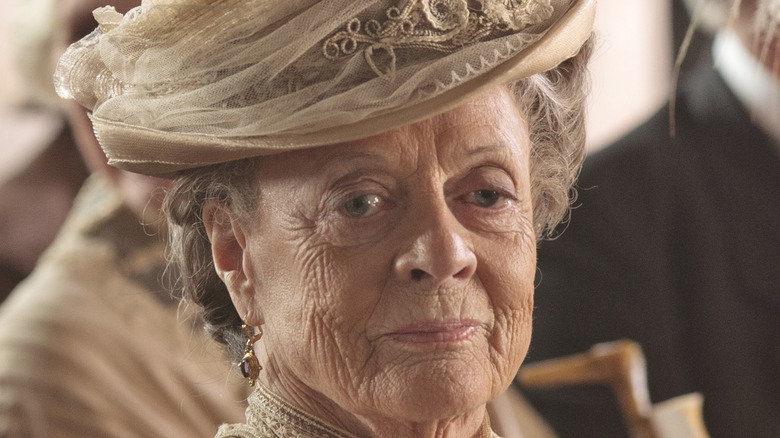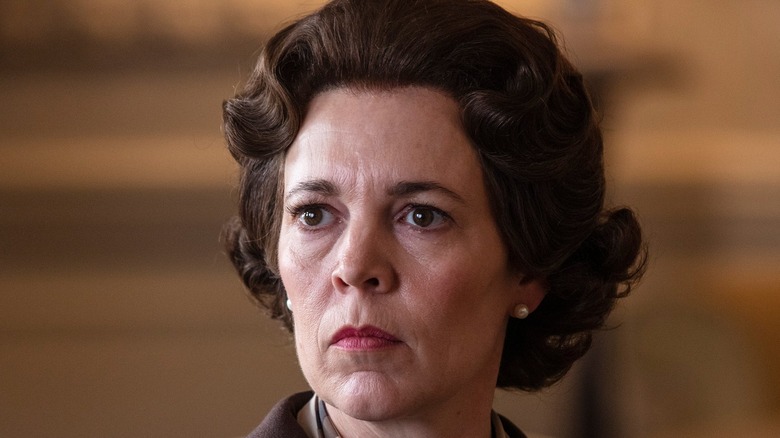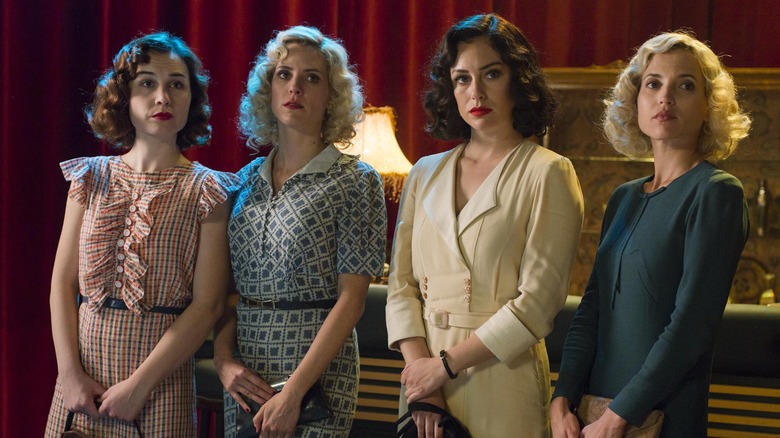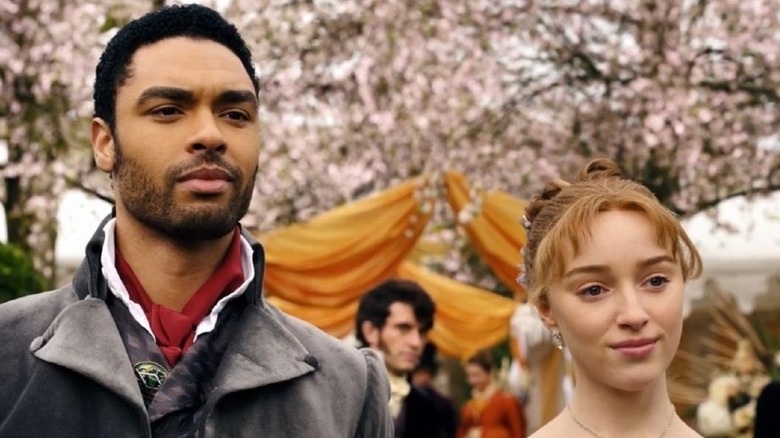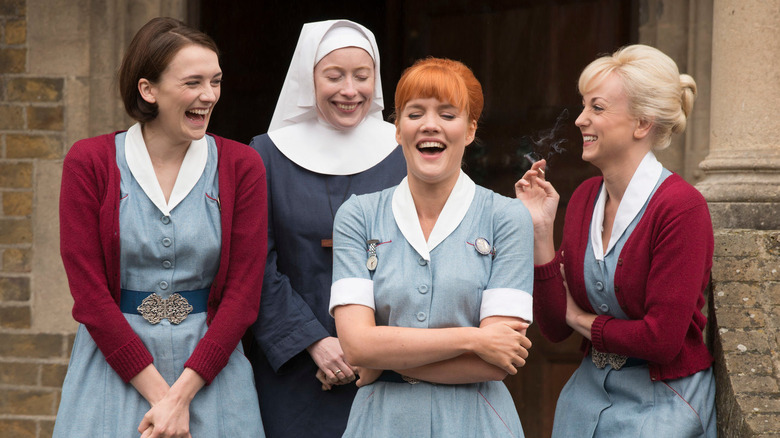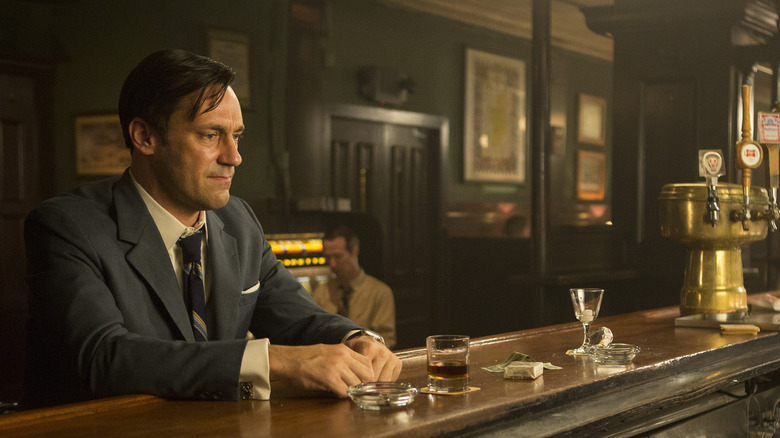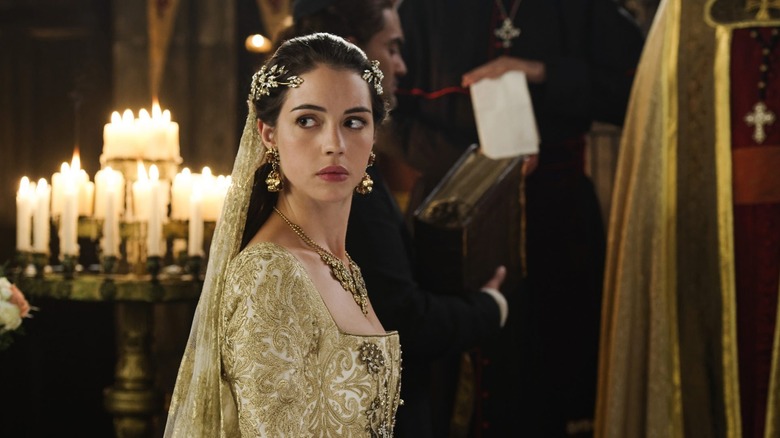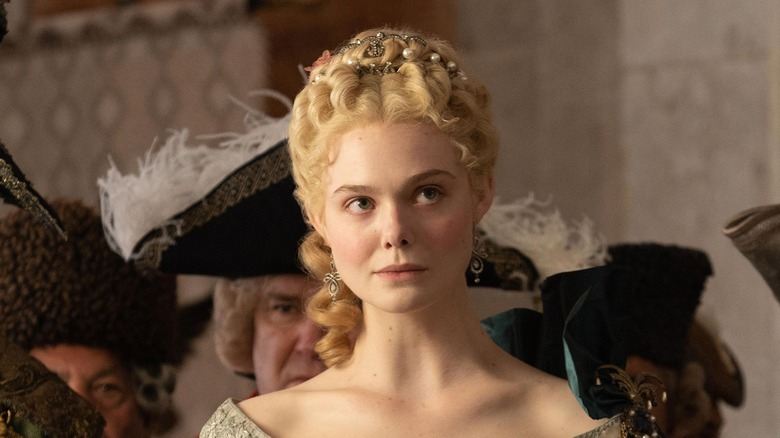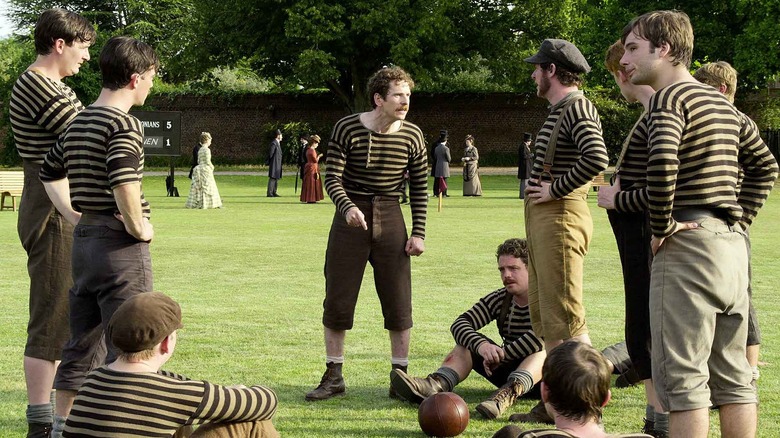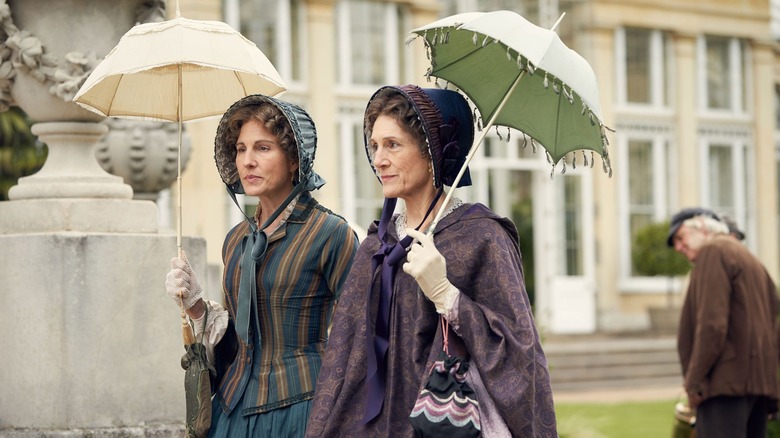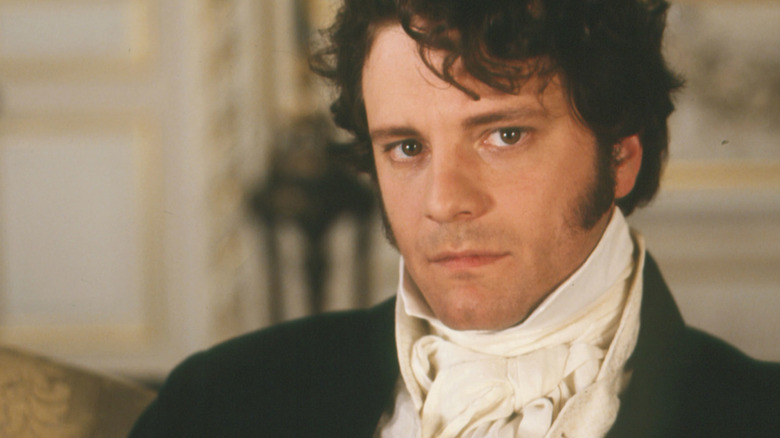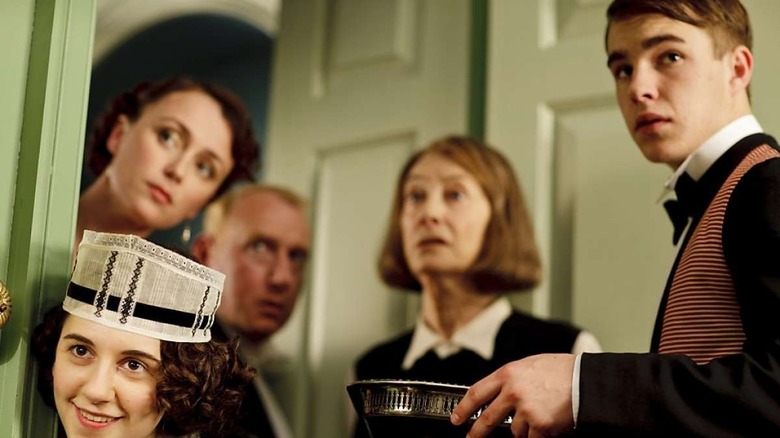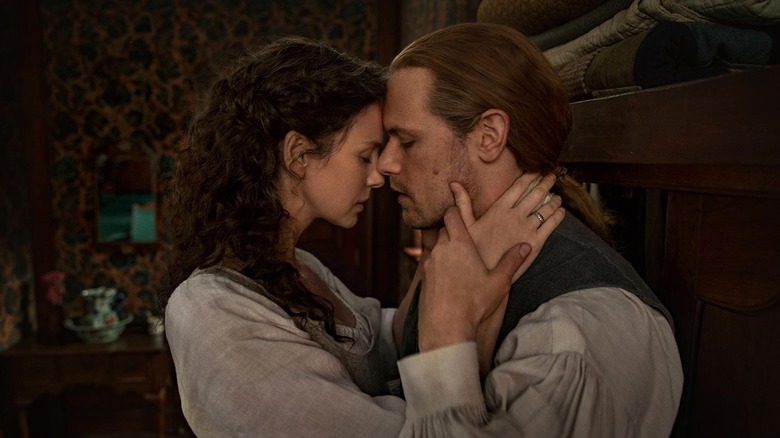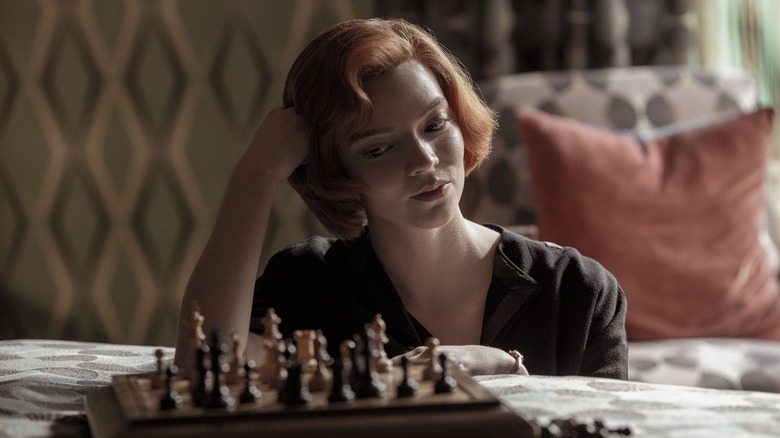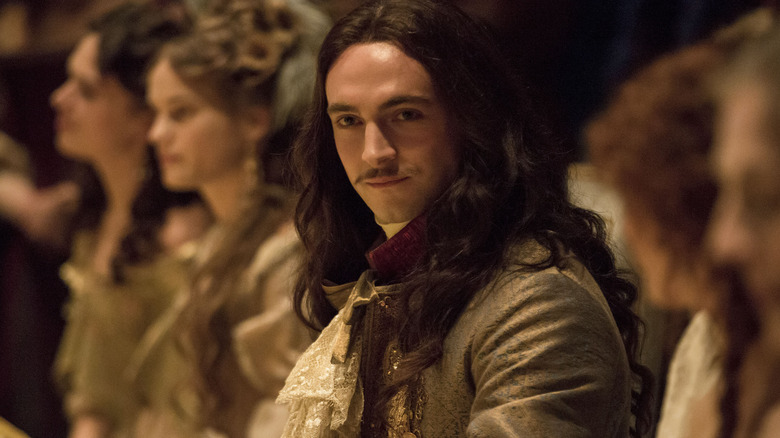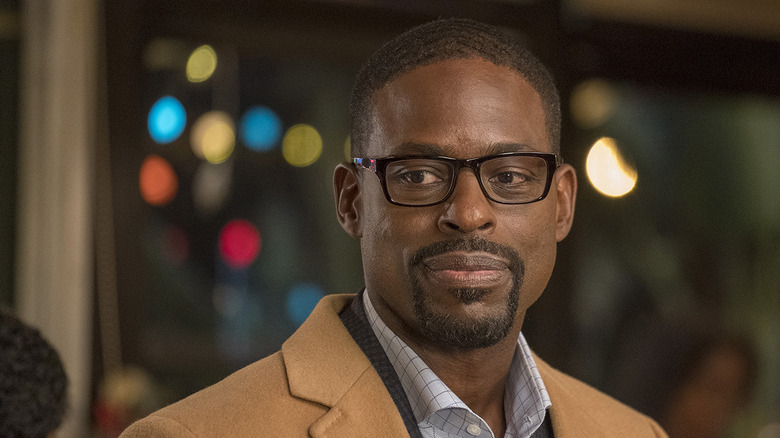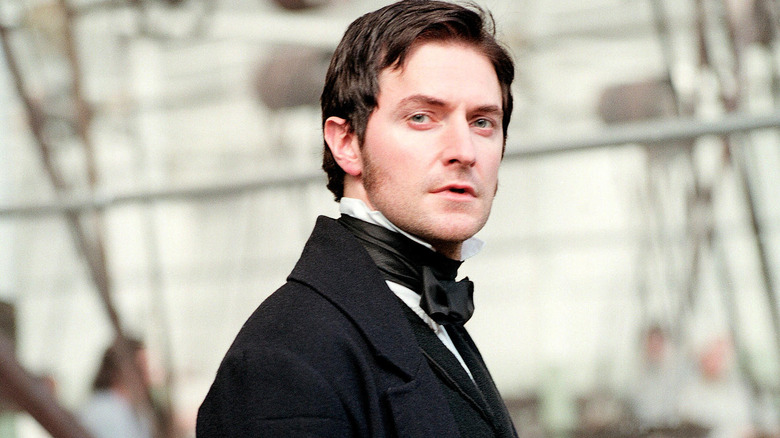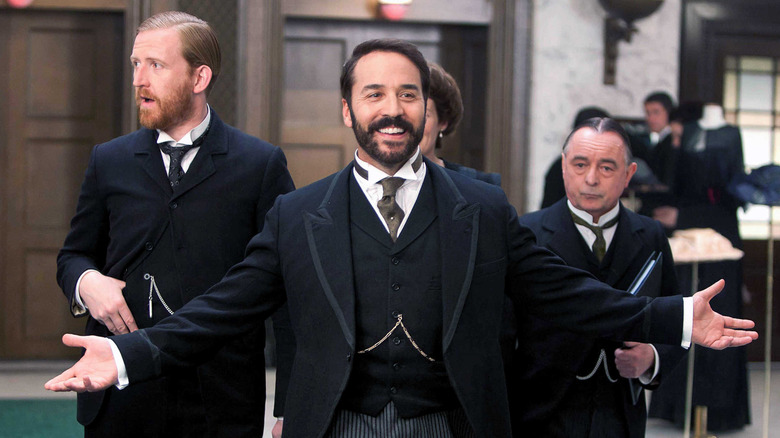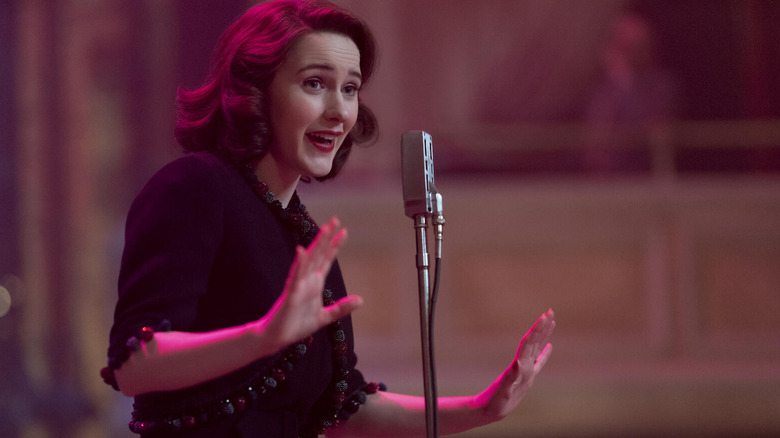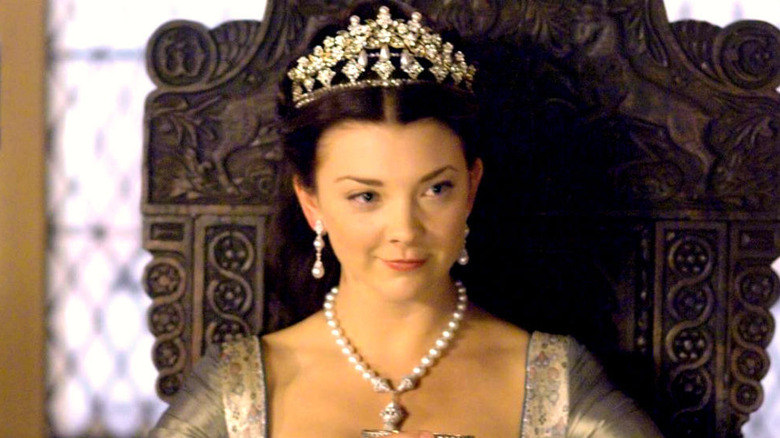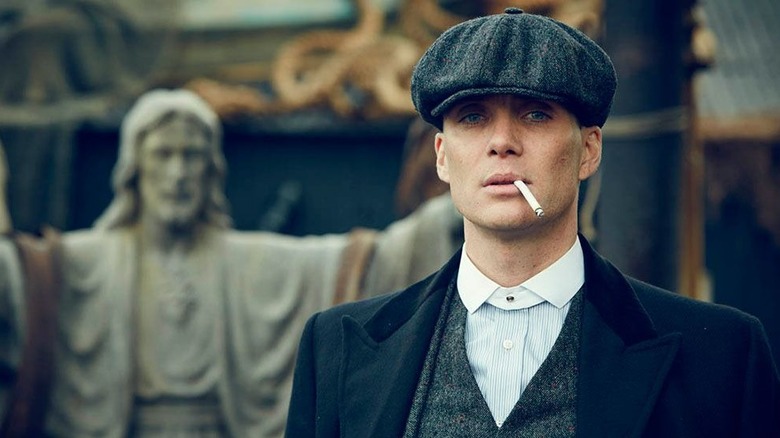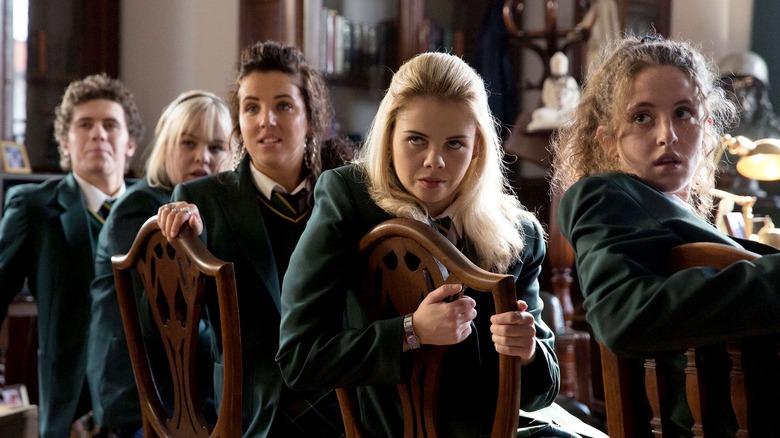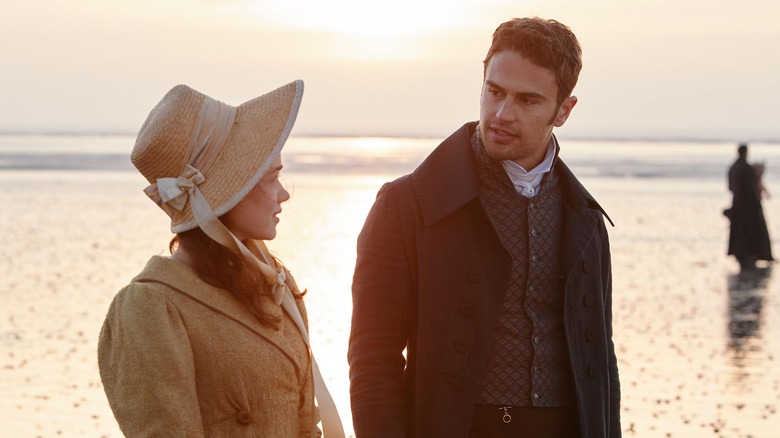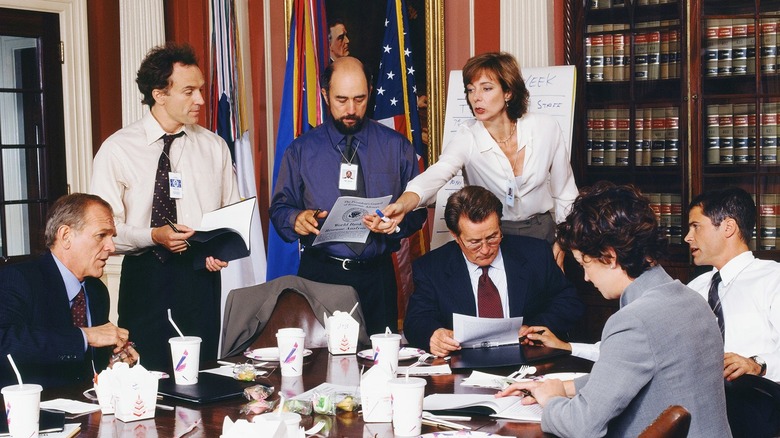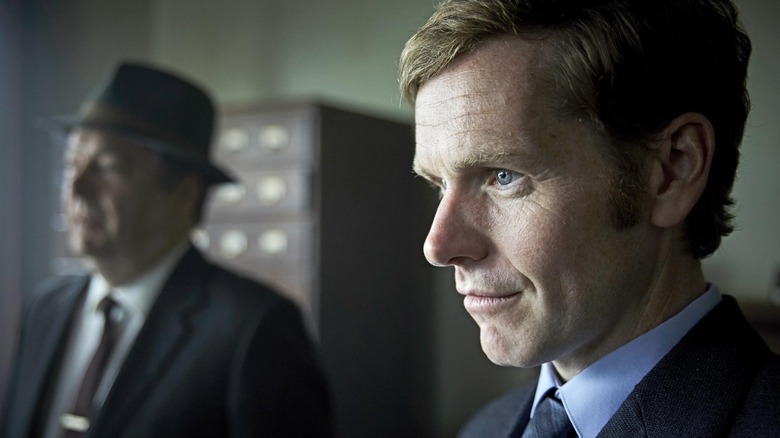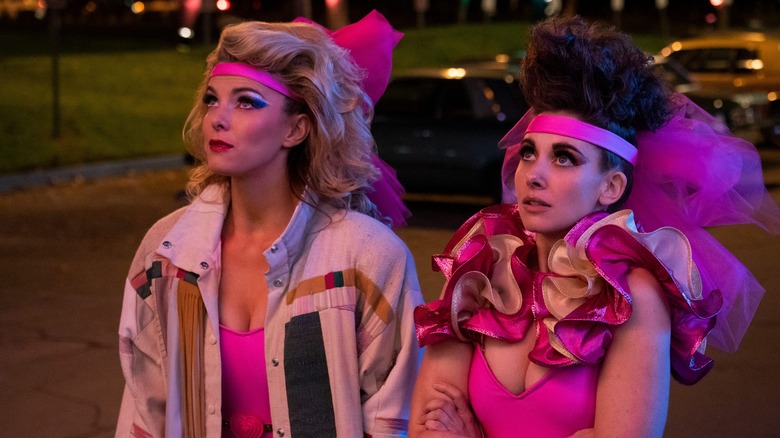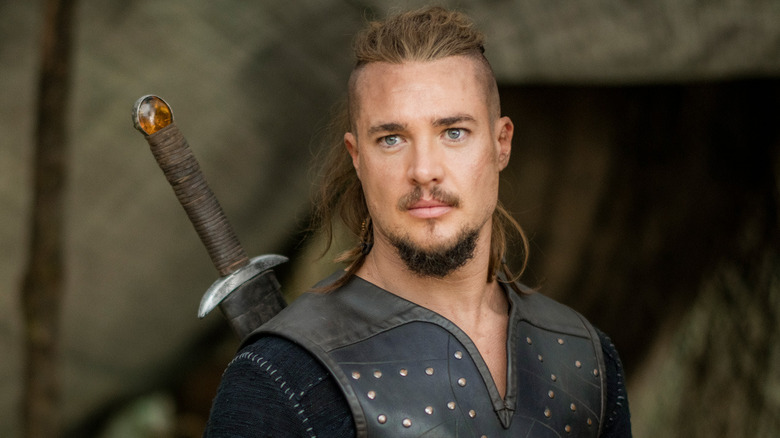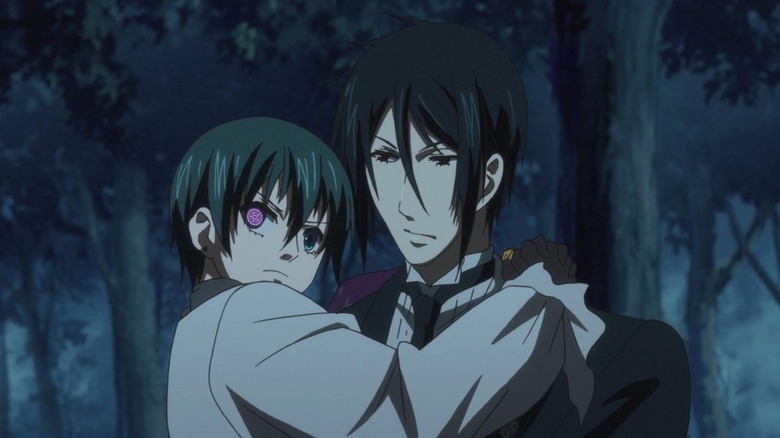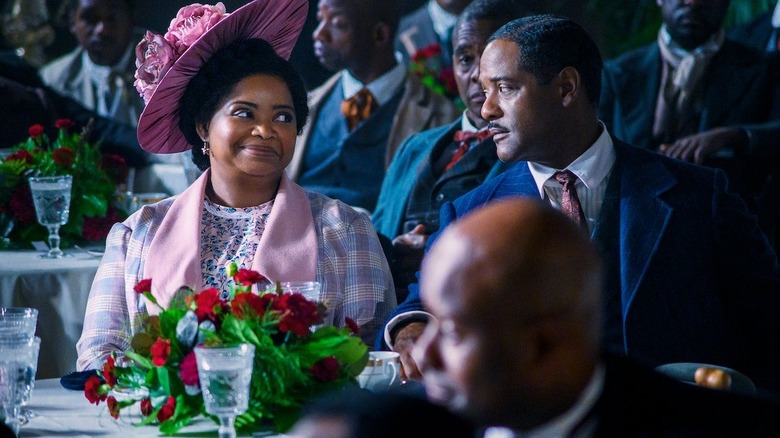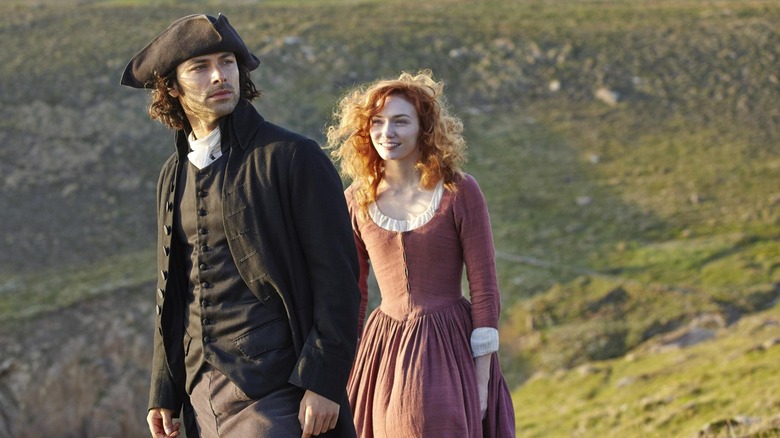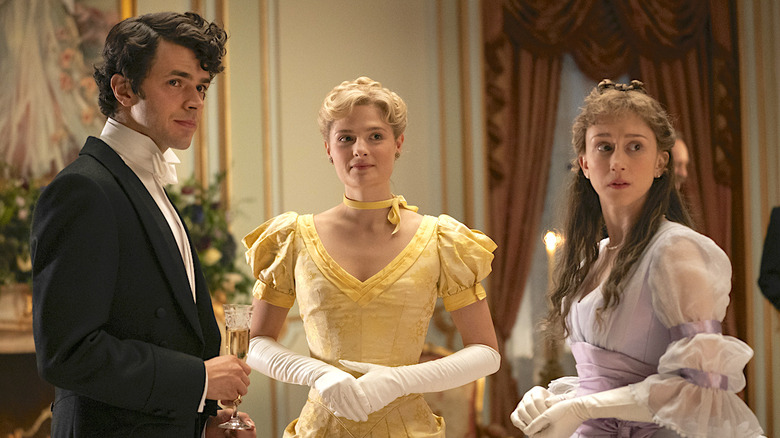30 Shows Like Downton Abbey You Should Watch Next
More than a decade after it first premiered on ITV, "Downton Abbey" remains a huge staple of both modern television and pop culture at large. The show's six original seasons have received great acclaim and numerous awards, including 15 Emmy Awards and 69 total nominations, and in the wake of the series finale in 2015, the franchise has expanded to include a feature film in 2019, with a second currently on the way.
It's easy to see why "Downton Abbey" has remained so popular for so long. Its sharp writing, gorgeous production design, and ensemble cast of talented actors makes it compelling and easy to watch at the same time. The series deals with some of the biggest events of the 20th century through a lens of British aristocracy, from the sinking of the Titanic to World War I, and it dissects those real-life touchstones with tact, gravity, and intelligence. Anchored by exceptional performances from the likes of Dame Maggie Smith, Hugh Bonneville, Laura Carmichael, and Jim Carter, the show's massive collection of stars makes every episode and story arc dramatic and entertaining.
Sadly for fans, you can only watch and rewatch "Downton Abbey" so many times, and new stories in the franchise these days are few and far between. The good news for those looking for more "Downton" in their lives is that there are plenty of other fantastic shows that were either born in the wake of the "Downton" phenomenon or simply feel like kindred spirits. From British period dramas to crime sagas and romantic fantasies, here are some other exceptional series that "Downton Abbey" fans should check out next.
The Crown
Netflix's "The Crown" has become one of the most acclaimed and awarded TV shows of the 21st century over its four seasons. The series delivers incredibly well produced, written, and acted period drama, and it should be an instant next step for anyone who has fallen in love with "Downton Abbey."
For those who aren't familiar with "The Crown" (an admittedly small group in all likelihood), here's the basic pitch: The show follows the British monarchy through the latter half of the 20th century, with Queen Elizabeth II and Prince Phillip serving as the primary protagonists. "The Crown" covers decades of history, with multiple roles being recast over the course of its run to keep ages appropriate for all the main characters. The entire ensemble is uniformly excellent, but particular credit goes to Claire Foy and Olivia Colman's turns as Elizabeth and Matt Smith and Tobias Menzies' performances as Phillip, as well as John Lithgow (Winston Churchill). The whole cast includes too many stellar performers to name them all, from Helena Bonham Carter and Vanessa Kirby to Gillian Anderson, Josh O'Connor, and Michael C. Hall.
If you like British period pieces, "The Crown" is a no-brainer.
Cable Girls
Looking for a story set in the same era as "Downton Abbey" but less attached to the whole British thing? Netflix's "Cable Girls" could be perfect. It's a bit soapier than "Downton," and it's more focused on a smaller group of core characters as opposed to a massive ensemble, but there are still a lot of similarities here.
"Cable Girls" begins in Madrid at the end of the 1920s, and it tells the story of four women who all begin working as switchboard operators for a new telecommunications company in the city. The show's five seasons follow them through a wide range of personal arcs and larger socio-political situations, including the Spanish Civil War, the rise of European fascism, and the fight for women's rights in the early 20th century. It also has a pretty wild ending, but you should find that one out for yourself.
At times, "Cable Girls" is a fun and melodramatic soap opera, filled with secret identical twins, fake deaths, and love triangles. But that soapy tone doesn't stop the show from getting serious and even quite dark at times. It's a series about female empowerment, oppression, the struggle for LGBTQ+ equity and acceptance, and much more, all while still carrying the lighter vibes of far sillier shows. We recommend watching in the original Spanish with subtitles, but for those who prefer an English dub, that's available as well.
Bridgerton
"Downton Abbey" takes pains to be historically accurate and tonally appropriate for its particular era of British history. Netflix's romantic drama "Bridgerton," on the other hand, does not. After just one season, the Shonda Rhimes series became one of Netflix's biggest ever (per The Verge), but its success is due to the ways it changes the Regency era, rather than the accuracy with which it portrays it.
Based on the popular romance novels by Julia Quinn, "Bridgerton" imagines an alternate version of 19th century London that drips with style in every single scene. From the costume design and the cinematography to the soundtrack and the writing, "Bridgerton" looks and feels lavish in every sense of the word. In only eight brief episodes, it made Regé-Jean Page and Phoebe Dynevor rising stars, captivating audiences with the impassioned love story of Daphne Bridgerton and Simon Basset.
If you haven't watched "Bridgerton" by now, it's the perfect time. More seasons and spinoffs are on the way, meaning that you'll be setting yourself up for years to come. Yes, the whole show is fluffier, sexier, and more flamboyant than "Downton Abbey," but that's the point. It's fun and colorful in a way that these sorts of period pieces rarely are, which is what truly sets "Bridgerton" apart from the crowd. And just like "Downton," "Bridgerton" has a massive cast full of characters both large and small just waiting for you to fall in love.
Call the Midwife
BBC One's long-running medical drama "Call the Midwife" is similar in tone and style to "Downton Abbey," but it exchanges the historical estates of the British aristocracy for the modest architecture of London's East End and swaps the World War I era for the 1950s and '60s. The series has received high praise for its cast, writing, historical accuracy, and handling of serious subject matter, including from publications like The Wall Street Journal and The Washington Post.
Based on the real-life memoirs of British midwife Jennifer Worth (at least at first), "Call the Midwife" tells the story of an Anglican nursing convent in the impoverished London community of Poplar. The main focus is on the midwives who help deliver babies and provide medical, but through the web of extraneous characters who weave in and out of the story, "Call the Midwife" also touches on issues of class, race, gender inequality, religious discrimination, and more.
There are a lot of birth scenes and other trademarks of the medical drama genre, which may turn off some squeamish viewers. But for those who are familiar with the genre and want something similar to "Downton Abbey," "Call the Midwife" is a great choice. Plus, with nine seasons and nearly a hundred episodes to binge, this show should keep you busy for a while.
Mad Men
Great period dramas aren't exclusive to an English setting, and AMC's "Mad Men" is a reminder of that. Starring an ensemble cast led by Jon Hamm, Elisabeth Moss, Vincent Kartheiser, Christina Hendricks, January Jones, and John Slattery, "Mad Men" takes place in the alcohol-soaked world of New York City advertising agencies in the 1960s. The show was a primetime titan during its seven-season run, winning 16 Emmy Awards along the way, and it's just as worth the watch now as it was then.
All the trademarks of great period dramas are present in "Mad Men": incredibly detailed costume and set design, interesting tie-ins to real historical events, rapid fire dialogue that falls just a bit outside the realm of realism, and a tense web of character relationships that grows more and more complicated as the series develops. The series made Hamm a star, and it's easy to see why as soon as you start watching. In every scene that he's in, be it a high-stakes advertising pitch or a drunken conversation in a bar, Don Draper oozes charisma and detestableness in equal measure — and as much as everyone else tries, nobody seems to loathe the man as much as he hates himself.
While Hamm's Draper may lead the way, pretty much every performance in "Mad Men" is top notch, with the show winning the Screen Actors Guild award for Outstanding Performance by an Ensemble in a Drama Series twice.
Reign
Some historical TV shows, like "Downton Abbey," take immense care to be as accurate to true events as possible. Others, like The CW's "Reign," don't. Reign is the kind of show that prioritizes mystery and soapy drama over rigid historical accuracy, and while that approach earned it some mixed reviews over the course of its four seasons (via Rotten Tomatoes), it also makes for some good, clean, silly fun.
"Reign" stars Adelaide Kane as the young Mary, Queen of Scots. Set squarely in the middle of the 16th century, it's a story full of betrothals, betrayals, forbidden love, and revenge, all executed with The CW's trademark style. Think "Riverdale" in the 1500s with a lot of aristocratic flair and you'll be pretty close to the overall vibe of "Reign." It's pulpy in an entertaining way, while benefiting from the great costumes and aesthetic of a modern historical drama.
The Great
There's serious, and then there's soapy — and then, far on the other side, there's satirical — which is where Hulu's "The Great" resides. This comical, openly inaccurate portrayal of the life of Russia's Catherine the Great stars Elle Fanning as the eponymous empress and Nicholas Hoult as Emperor Peter III, and it's a frequently hilarious, refreshing break from the usual seriousness of historical TV.
"The Great" is a show that stares some pretty brutal history square in the face and dares to laugh, and Fanning carries that task off with flying colors. Her performance as Catherine is as riveting as it is funny, and the whole series makes a wild world of 18th century Russia. Murder, treachery, scheming, arson, bears, and more all play into the story of "The Great," making for a period drama truly unlike any you've seen before. And with Season 3 already on the way, it's the perfect time to hop on board.
The English Game
"Downton Abbey" fans looking for something as close in style to the original show as possible are in luck, as the past few years have seen the show's creator, Julian Fellowes, release several new series. One of those is "The English Game," which tells the story of how professional British football (or soccer for American viewers) rose to prominence across class lines at the end of the 19th century.
"The English Game" stars Edward Holcroft, Kevin Guthrie, Charlotte Hope, Niamh Walsh, Craig Parkinson, and James Harkness. It received mixed reviews when it premiered on Netflix in 2020, with Lucy Mangan of "The Guardian" going so far as to call it "Downton Abbey for boys" and "Terrible." Other critics were kinder, like John Doyle of "The Globe and Mail," who called the series "a sweet, nicely made diversion" upon its release.
For "Downton Abbey" diehards, however, the reviews probably don't matter all that much. This is a Fellowes production from start to finish, complete with all the touches of style and structure that fans of his most popular series have come to expect. Is this his cleanest or most elegant show? No. But those who love his work will likely find the episodes compelling, comfortable, and easy to watch.
Belgravia
Another 2020 miniseries from Fellowes, "Belgravia" follows several prominent Londoners in the early 19th century who navigate politics, courtship, and society over the course of a few decades. There's war, loss, betrayal, love, and loads of family secrets to keep the melodrama going — all with a production budget and style on par with "Downton Abbey."
Like "The English Game," "Belgravia" is only six episodes long, making it a quick and easy watch. Though it is set nearly a hundred years prior to "Downton," much of the tone and pacing of the drama is comparable, so longtime fans of Fellowes' work should feel right at home. Yes, "Belgravia" lacks some of the elegance of the "Downton" story, but even when plotlines are a bit soapy, they continue to be fun.
In truth, this may be the most natural next step for anyone craving more "Downton Abbey." The series holds a strong 75% on Rotten Tomatoes, making it an easy recommendation.
Pride and Prejudice
While we're talking about miniseries, let's give a shout out to one of the most popular British historical miniseries ever, 1995's "Pride and Prejudice," starring Colin Firth and Jennifer Ehle. Debate still rages over whether the 1995 version or the 2005 Kiera Knightley film is the superior adaptation of Jane Austen's famous novel, but since we're only discussing shows today, we'll focus on the Firth version.
Austen is of a wholly different era than "Downton Abbey," but the shows are still comparable in many ways, dealing as they both do in the elaborate affairs, courtships, rules, and the drama of wealthy English families. The love story of Elizabeth Bennet and Fitzwilliam Darcy has become a staple of pop culture, even today, because of the enduring appeal of their enemies-to-lovers dynamic. The 1995 BBC One series captures their saga beautifully in its six episodes, which are packed with subtle flirting, longing glances, and fancy dances.
The success of "Pride and Prejudice" is in its perfectly-balanced tone. It's formal without being too stuffy, and fun without being too silly. Austen's characters are vivid and relatable, but they also hold the fantastical allure of an elegant era gone by.
While you're at it, be sure to give the book a read too if you haven't.
Upstairs Downstairs
BBC One's "Upstairs Downstairs" is a revival (and technically a sequel) of the 1970s ITV drama of the same name. Both series are worth checking out if you like the servant/aristocrat dynamic of "Downton Abbey," but we'll focus on the newer series here, as it doesn't require excessive familiarity with its predecessor to be enjoyed.
Though it premiered just months after the first season of "Downton Abbey" in 2010, "Upstairs Downstairs" ended up being much more short-lived, ending after two brief seasons (the original ran for five seasons from 1971 to 1975). The story takes place in the late 1930s and follows the residents of a classical London townhouse, both owners and staff. There are all the different sorts of plotlines you'd expect from the drama, including tragic histories, hidden secrets, and the slow forming of community across social barriers. It's well made and elegantly styled, and it earned high praise for staying true to the original series while modernizing it at the same time.
Outlander
If you like a little fantasy with your historical fiction, the beloved Starz series "Outlander" is the perfect choice. Based on the popular novels by Diana Gabaldon, "Outlander" stars Caitríona Balfe as Claire Randall, a World War II nurse magically transported back in time to mid-18th century Scotland, where she falls in love with a Highlander named Jamie (Sam Heughan). The rest of the series follows Claire's journeys back and forth between the two time periods, the love triangle between her, Jamie, and her present-day husband Frank (Tobias Menzies), and their role in a number of major historical events.
"Outlander" has been held up as one of the best TV shows of the past decade (per Cinema Blend), with particular praise going to its gorgeous design and talented ensemble cast. Of course, the main dramatic pull here is the love story, which is full of great moments both tender and tense. The production values here are sky-high, delivering visions of the distant past that will instantly transport you. And while they're not the driving force in the story, the little bits of magic woven here and there add a nice texture that separates "Outlander" from other period pieces.
The Queen's Gambit
Many of the defining traits of "The Queen's Gambit" may seem entirely unrelated to "Downton Abbey" at first glance. Cold War politics, middle-American drug addiction — it all seems a million miles away from the English countryside and World War I. But for those who love hand-crafted period dramas with deep, nuanced character development and incredible production design, Netflix's chess saga is a must-watch.
Anya Taylor-Joy delivers a powerhouse performance as Beth Harmon, the young chess prodigy who takes the game by storm. And the cast is filled out nicely with similarly outstanding turns from the likes of Marielle Heller, Harry Melling, Moses Ingram, Bill Camp, and Thomas Brodie-Sangster. At its core, "The Queen's Gambit" is a singular, focused character study of one person's rise, fall, and resurrection. There are side characters, but no side plots. However, that tight focus on Beth doesn't inhibit the show from touching on a number of big themes, from found family to self-destructive behavior.
The show is not without its issues, chief among them a portrayal of drug use that can be problematic at times (per Harper's Bazaar), but viewed through enough of a critical lens, the best parts of the series truly shine. There's a reason "The Queen's Gambit" won the Primetime Emmy Award for Outstanding Limited or Anthology Series in 2021, along with numerous other accolades.
Versailles
"Versailles" tells the story of the eponymous French palace and how it was built by King Louis XIV in the mid-17th century. It may not be the most critically-acclaimed historical drama available, but there's still a lot of fun to be had here if you love plotting, rivalries, and beautiful, period-appropriate costuming.
Originally aired on the French TV channel Canal+, "Versailles" stars an ensemble cast led by George Blagden as Louis XIV and including Alexander Vlahos, Tygh Runyan, Stuart Bowman, Amira Casar, Evan Williams, Noémie Schmidt, and Anna Brewster, among others. It's a colorful, lush, and at times dangerous depiction of the French nobility, with a lead character who you'll quickly come to despise (but that's the point).
The main appeal here is the aesthetic presentation, but there is also lots of drama to keep viewers entertained. And at a clean 30 episodes, "Versailles" is an ideal length to binge — not so short that it doesn't stick with you, not so long that you'll trail off along the way.
This is Us
Okay, yes, NBC's "This is Us" is decidedly not a period drama, unless you count modern America as "period." It's not about the super rich. It's about ordinary people dealing with real, relatable problems, tragedies, joys, and relationships. It's also been nominated for nearly 40 Emmy Awards, with four big wins. It's one of the most lauded shows in modern network TV history, and if you're prepared for a lot of tearful scenes and heavy emotional storylines, you just may fall in love with it.
"This is Us" thrives on the merit of its characters and their relationships. At the core it's about three adult siblings, played by Chrissy Metz, Justin Hartley, and Sterling K. Brown. Those central protagonists are surrounded by a huge ensemble of talented costars, including Milo Ventimiglia, Mandy Moore, Susan Kelechi Watson, Chris Sullivan, and Ron Cephas Jones. Throughout its six seasons, the show explores themes of family, trauma, loss, love, forgiveness, discrimination, and more. It's a smart, openly heartfelt drama about how we treat the people in our lives, and how those behaviors are shaped by our childhoods.
This is not the show to watch for big, beautiful, historical costumes. But if you're looking for compelling human drama, "This is Us" is one of the best.
North & South
Set in the mid-19th century, "North & South" tells the story of the Hale family, who move from the south of England to the fictional northern town of Milton. There they encounter the wealthy Thornton family, who own the local mill. Most of the tension in the four-episode miniseries plays on ideas of class division and prejudice, as well as antiquated gender roles and their impact on England in the 1800s. At the heart of "North & South" is the love story between Margaret Hale (Daniela Denby-Ashe) and John Thornton (Richard Armitage), which acts as a sort of microcosm for the town's larger social tensions.
This is a historical drama with real substance to it, and it's anchored by the strong performances and shared chemistry of its two romantic leads. Armitage in particular would go on to become a Hollywood star after making waves as John Thornton, playing Thorin Oakenshield in Peter Jackson's "The Hobbit" trilogy. "North & South" focuses more on the industrial working classes than the aristocracy or their servants, which will be a bit of a change for those accustomed to the specific social circumstances of "Downton Abbey," but the differences really aren't so dramatic. This is a strong, well-produced, and joltingly-short series led by deeply human performances, and it's still entertaining almost two decades after ending its run.
Mr. Selfridge
Those who watched "Downton Abbey" as it aired on ITV or PBS may have also caught episodes of "Mr. Selfridge," another early-20th century British period drama that ran on both channels from 2013 to 2016. The series is named for its lead protagonist (played by Jeremy Piven): Real historical figure Harry Gordon Selfridge, who became one of the biggest businessmen in London after founding the Selfridges department store.
Because of its real-world subject matter, "Mr. Selfridge" deals with true historical events (though it also makes changes for the sake of drama, of course). And because it was both produced at the same time as "Downton" and takes place in the same era, there are a lot of similarities. However, the series also has touches of series like "Mad Men," in keeping with its stronger focus on a single, ambitious protagonist.
Critics have taken issue with "Mr. Selfridge" for being a bit on the soapy side and prioritizing surface-level entertainment over more complex storytelling (per The New York Times), but there's nothing wrong with a lighter, less serious show. If that's what you're looking for, "Selfridge" is a good one.
The Marvelous Mrs. Maisel
Since Amazon began producing original streaming series for its Prime Video service, "The Marvelous Mrs. Maisel" has been one of its best (per TV Guide). Each of the show's three seasons have earned Emmy nominations for Outstanding Comedy Series and Outside Lead Actress in a Comedy Series for star Rachel Brosnahan, with the first season winning in both (as well as numerous other awards).
What makes "Mrs. Maisel" so good? Truthfully, it's a combination of things. The cast is exceptional, from Brosnahan's commanding lead performances to supporting stars like Alex Borstein, Michael Zegen, Marin Hinkle, and Tony Shalhoub. The 1950s and '60s era costuming, set dressing, and overall aesthetic are enrapturing and instantly transport viewers back in time. But more than anything, "Maisel" is great because of the balance it strikes between comedy and drama. This is a very funny show, and Midge Maisel is a very funny character. At the same time, the series touches on real issues like racial discrimination and gender inequity, all through a series of masterfully written character relationships. It's intelligent, sharp, witty, and endlessly entertaining — a home run in basically every regard, especially for fans of period-piece TV.
The Tudors
"The Tudors" hits every major mark you'd expect of a prestige historical drama: lavish costumes, beautiful style, an ensemble of young and talented stars, and numerous plot threads of love, betrayal, and intrigue. The Showtime series ran from 2007 to 2010 with Jonathan Rhys Meyers in the lead role of King Henry VIII. Maria Doyle Kennedy, Natalie Dormer, Anita Briem, Annabelle Wallis, Joss Stone, Tamzin Merchant, and Joely Richardson co-starred throughout the show's run, playing the women who Henry notoriously married and disposed of.
Like other shows of its type, "The Tudors" received some criticism for prioritizing lush style and entertainment value over historical accuracy (per The New York Times), but it was a hit with viewers, possibly for that very reason. Dealing with the life of an evil, murderous man like Henry VIII comes with its own set of challenges, and "The Tudors" plays pretty fast and loose with the King's reign. However, if you go in with the understanding that the series is heavily fictionalized and focus more on the exceptional production design and great performances, you'll likely have a good time.
Peaky Blinders
Though it's set around the same time as "Downton Abbey," "Peaky Blinders" shows a very different part of early-20th century England. The series mostly takes place in the industrial city of Birmingham, and later in London, and follows the eponymous Peaky Blinders — a gang that goes from small-time gambling and protection rackets to much larger, more profitable criminal operations. Cillian Murphy leads the show as Blinders boss Thomas Shelby, surrounded by other brilliant stars like Tom Hardy, Finn Cole, Anya Taylor-Joy, Sam Neill, and the late, great Helen McCrory.
"Peaky Blinders" is a crime drama through and through, complete with twists, betrayals, and danger waiting for the core characters around every turn. There are similarities with shows like "The Sopranos," but the period-piece elements of "Peaky" makes it a very different viewing experience. It's a show that's just as interested in the historical events of the time as it is in the gang politics of its criminal underworld. The traumatic repercussions of World War I, the rise of labor organizing, the massive class divides of early industrialism, Ireland's bid for independence and more are all covered in "Peaky Blinders," and each adds a lot of depth to the world of the show.
Really, though, "Peaky Blinders" is a show that anyone with the stomach for it can enjoy. It is headlined by outstanding performances and anchored by tight and sharp writing. At the end of the day, you don't need much more than that.
Derry Girls
Though it is set a bit closer to modern times than a show like "Downton Abbey," Channel 4's "Derry Girls" still carries a lot of the stylistic flair and historical grounding that define good period-piece TV. It also happens to be hilarious, which never hurts.
Set in Northern Ireland in the 1990s, "Derry Girls" shows the region's political and social unrest through the eyes of a group of teenagers. The young cast of Saoirse-Monica Jackson, Louisa Harland, Nicola Coughlan, Jamie-Lee O'Donnell, and Dylan Llewellyn play off each other perfectly, expertly balancing the comedy of the series' teen antics with the more serious subject matter of its historical background.
"Derry Girls" has earned high praise since its premiere (via EW), with a 100% percent rating for season 1 and a 97% rating for season 2 on Rotten Tomatoes. It's bright, brash, cuttingly funny, and led by a core group of exceptional characters. A series as smart as it is entertaining, whether dealing with coming-of-age character arcs, larger social commentary, or just the comical atmosphere of secondary school parties, "Derry Girls" is a winner.
Sanditon
Jane Austen's most famous works have been adapted numerous times for stage and screen, but one book that has received less love over the years is her late-career, unfinished novel "Sanditon." Fortunately for the Austen diehards of the world, ITV delivered a proper adaptation in 2019, starring Rose Williams and Theo James.
The series takes place in the beach resort town of Sanditon, where lead protagonist Charlotte Heywood (Williams) navigates social circles and looks for love with local bad boy Sidney Parker (James). Because Austen only completed a few chapters of her original "Sanditon" manuscript, the show is largely original material, taking inspiration from the characters and plot points already laid in place and expanding on them in new and interesting ways.
The freedom allowed by the book's unfinished nature is what gives "Sanditon" much of its excitement, prompting multiple additional seasons to be ordered after the first ended its run. There is some debate on how accurate the new additions to the story are to Austen's original intentions (via Radio Times), but given how many rigidly-accurate Austen adaptations there have been over the years, it's exciting to see writers take her world in a different direction.
The West Wing
Aaron Sorkin was an established name before he created "The West Wing" for NBC, largely because of his acclaimed screenplay for "A Few Good Men," but this contemporary political drama is what made him a household name. Based around the administration of fictional United States President Jed Bartlet (Martin Sheen), "The West Wing" conjures an idealized vision of American politics that's immensely entertaining, if a bit far-fetched given today's political climate (per Paste).
"The West Wing" has a lot of flair thanks to Sorkin's now-iconic stylistic touches — walk-and-talk scenes, Shakespearean monologues, and sharp, rapid-fire dialogue. The show thrives off of Sorkin's clever writing and an impressive assemblage of stars, including Bradley Whitford, Richard Schiff, John Spencer, Rob Lowe, Allison Janney, Dulé Hill, and Jimmy Smits.
The social machinery of the White House via "West Wing" is akin in many ways to that of Downton Abbey, giving both shows a similar ensemble feel. Of course, there isn't much historical style in Sorkin's contemporary political landscape, so those who come to "Downton" mainly for the lushness of the production may find "The West Wing" lacking.
Endeavour
There is a nearly endless stream of British detective dramas available, and putting them all on this list would make it far too long. Instead, we'll highlight one of the best options in the genre for fans of "Downton Abbey": "Endeavour," which began airing on ITV in 2012. A prequel to the popular "Inspector Morse" series (which itself is based on the mystery novels by Colin Dexter), "Endeavor" follows the eponymous Endeavour Morse, a police detective working in the city of Oxford in the 1960s and 1970s.
If you've seen shows like "Sherlock" or "Midsomer Murders," you already have a pretty good idea of what to expect from Endeavour — episodes of about 90 minutes apiece, each telling the self-contained tale of a different case. The core cast develops gradually through long character arcs, but the main focus is on the individual mysteries. What makes "Endeavour" particularly fun is that it also gets to play with historical influences, tying the sociopolitical landscape of 1960s Oxford into the various cases Morse is tasked with solving. It's a winning formula, and one that has kept the series on the air for a decade.
GLOW
When you think of the historical eras and subjects common in TV adaptations, your mind may not immediately jump to professional women's wrestling in the 1980s. Netflix's "GLOW" may sound niche in its narrative focus, but it's a wildly entertaining, incredibly stylish show that delivers laughs, action, and plenty of drama.
Starring Alison Brie, Betty Gilpin, Sydelle Noel, Britney Young, and Marc Maron, "GLOW" takes its name from the real-world '80s fad Gorgeous Women of Wrestling. The series follows GLOW through its early years, focusing just as much on the personal lives of its wrestling stars as on their development within the ring. Taking cues from the wrestling world on which it's based, "GLOW" is coated in a slick, stylish luster of bright colors and larger-than-life characters that give it a quick and compelling entertainment value. Don't let that superficial sheen fool you, though; there's a lot more going on beneath the surface. The characters are nuanced and smartly written, and their complicated relationships with each other lead to powerful, emotional storylines that underlie the spectacle.
The 1980s have been a popular fictional setting on TV for years, but "GLOW" still manages to deliver a unique look and feel. It's fun and gripping, and at just 30 episodes, it's an easy and entertaining watch.
The Last Kingdom
Based on the novels by Bernard Cornwell, "The Last Kingdom" is a medieval epic set in the late 9th century and early 10th century, focusing primarily on the conflicts between the Vikings and England's Anglo-Saxons. The main story centers on Uhtred (Alexander Dreymon), a Saxon kidnapped by Danish raiders as a child and raised with them to adulthood. As a man, Uhtred is caught in the middle of various tense political situations, forcing him to balance his birthright, his Danish upbringing, and his loyalty to his friends and family.
Before getting any deeper about what makes "The Last Kingdom" great, it's only fair to give a warning: This is a bloody, violent show. Especially in the later seasons produced wholly by Netflix, the battle scenes can get downright brutal, which may be a deterrent for some viewers. However it would be a fallacy to think that "The Last Kingdom" succeeds merely on the merits of its action scenes and shock value. There's a large cast of interesting characters at the heart of the series, each with their own desires and hidden agendas. If you like a bit more danger in your historical fiction, "The Last Kingdom" may be for you.
Black Butler
The Venn diagram of people who watch "Downton Abbey" and people who watch anime might not sound like it would have much overlap. But the thing about anime is that it's a medium, not a genre, covering all kinds of stories, settings, and tones. "Black Butler" is a dark, funny, macabre, and often unsettling series set in Victorian London, following the exploits of the young Earl Ciel Phantomhive and his demon butler and bodyguard, Sebastian. As the Queen's "watchdog," Ciel is tasked with a number of important tasks in service to the English crown, such as hunting down criminals or exposing conspiracies — all with the help of Sebastian.
There's a dark undercurrent to "Black Butler" that yields some occasionally-disturbing plotlines, but the show is also smart, witty, and emotionally resonant. It plays heavily into the stylistic nature of the Victorian era, while also embracing its supernatural elements in innovative ways. Both Ciel and Sebastian are compelling, layered characters, and watching their dynamic grow through the series is rewarding. There's a reason "Black Butler" is one of the most popular and successful anime in recent years (per CBR), and anyone looking for something different in their Victorian dramas should definitely give it a try.
Self Made
Netflix's "Self Made" tells the tale of Madame C. J. Walker, the first self-made woman millionaire. Set in the late 1800s and early 1900s, the four-episode limited series stars Octavia Spencer in a powerhouse leading performance, alongside Tiffany Haddish, Carmen Ejogo, Garrett Morris, Kevin Carroll, J. Alphonse Nicholson, and Blair Underwood. Walker's life — dramatized in spots — is a powerful story of perseverance, loss, triumph, family, and defying the odds, set against the backdrop of America's heavily bigoted post-Civil War landscape.
Because of its short length, "Self Made" almost feels like a lengthy movie, and can certainly be watched all in one sitting. However, it also uses the miniseries form in powerful ways, building out a number of character relationships and supporting plotlines that give the show depth and breadth despite its brevity. The whole series is carefully crafted from the script to the set dressing, but Spencer is unmistakably its star. Her performance garnered numerous award nominations, including one at the 2020 Primetime Emmys and a win at the 2021 NAACP Image Awards.
Poldark
Set in the wake of the American Revolutionary War, BBC One's "Poldark" follows former British army captain Ross Poldark (Aidan Turner) as he returns to his home town of Cornwall and picks up the pieces of the life he left behind during the war. The show covers about two decades in five seasons, most of which center on Poldark's love life, professional ambitions, and the larger social circles of his Cornwall community.
"Poldark" earned critical praise throughout its run from 2015 to 2019. The show's beautiful setting and striking style earned particularly high marks, as did the core romance storyline involving Poldark and Demelza Carne (Eleanor Tomlinson). If you're at all familiar with the genre, you know what to expect here: gorgeous costumes, fun characters, and a lot of relationship drama on all fronts. It's not revolutionary or terribly original in its structure, but it delivers the historical drama beats very well, making it a sure hit for viewers coming from a series like "Downton Abbey."
The Gilded Age
Topping off the list of "Downton Abbey"-style shows is another recent production from Julian Fellowes, HBO's "The Gilded Age." Set in New York City in the 1880s, "The Gilded Age" features many of the same basic plotlines and stylistic trademarks of "Downton," including class divides, the growing pains of societal change, and extremely extravagant parties. It's lavish, colorful, and deeply decadent, and its first season has earned a positive critical reception (via Rotten Tomatoes).
In particular, "The Gilded Age" has been lauded for its cast, led by the likes of Carrie Coon, Morgan Spector, Louisa Jacobson, Denée Benton, Taissa Farmiga, and Harry Richardson. Like "Downton Abbey," it's an ensemble show with numerous relationships and storylines forming a web-like narrative. New York is essentially a character in itself, and the series does a great job bringing one of the city's most famous eras to life in vivid color and boisterous revelry.
Fellowes' best work transports you. "Downton Abbey" became an international hit because of its ability to teleport viewers back in time to a distinct and almost fantastical time and place. That's the appeal of many historical dramas: The ability to recreate an era not as it truly was, but as you might imagine it to have been. "The Gilded Age" embraces that mission wholeheartedly, embodying many of the qualities that have made Fellowes' work so captivating for so many fans.
